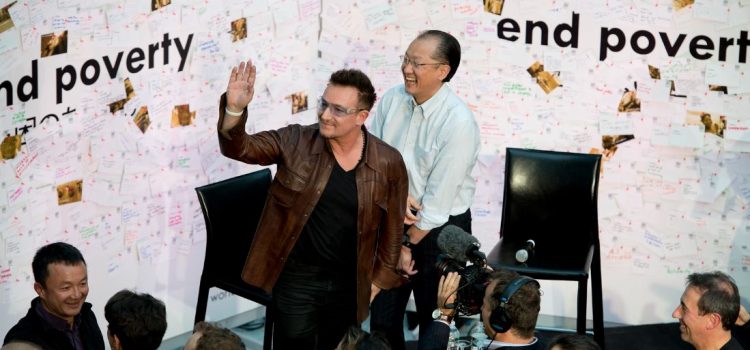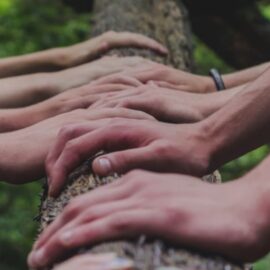
What activism work has Bono accomplished in his life? What is a white savior complex, and how does it relate to his experiences?
For U2 singer and songwriter Bono, fame was a way to shed light on social issues beyond the scope of U2’s music. You can draw insights from Bono’s experience into the greater world of celebrity activism.
Here’s a look at Bono’s activism, what causes he has supported, and how this relates to the white savior problem.
Bono’s Activism
Part of U2’s “self-serious” public image wasn’t because of the band’s music but because of Bono’s activism. Bono’s eyes were opened to the problems of poverty, sickness, and starvation when he and his wife Ali went on mission trips in the ’80s, so as his personal platform grew with U2’s fame, he made use of it to shine a spotlight on certain issues. In his memoir Surrender, Bono speaks about his advocacy for debt relief in Africa and the need to combat the global AIDS crisis. He also acknowledges some of the problems involved with Western philanthropy and celebrity activism.
One of Bono’s core beliefs is that problems such as poverty and hunger represent a failure of justice, not a lack of charity. The primary injustice he addressed in the ’90s as a spokesman for the Jubilee 2000 campaign was the vast amount of debt left over from the Cold War that the world’s poorest nations owed to the richest. Bono argues that having to pay off that old debt prevented whole countries from investing in themselves. The point of the Jubilee 2000 project was to get the lender nations, including the US, to cancel poorer countries’ debt altogether, freeing their resources for education, health, and infrastructure. The Jubilee 2000 campaign was successful, and its core group of activists looked for their next project.
(Shortform note: The Cold War debt that Bono refers to grew dramatically in the 1970s. As the US and the Soviet Union wooed other countries to their respective forms of government, Western nations offered low-interest loans to developing countries in return for staving off Communist movements. During this time, the collective debt of the developing world grew from $70 billion to $750 billion, which when coupled with the Great Inflation of the 1970s, threatened a massive, worldwide loan default. Prior to the Jubilee 2000 campaign that Bono became heavily involved with, the World Bank and the IMF tried to relieve the debt crisis, but in ways that imposed heavy restrictions on borrower countries’ economic policies.)
The issue that Bono and his colleagues tackled next was the African AIDS epidemic. However, Bono points out that with the change in US government in 2001, he now had to reach out to President George W. Bush after having spent years mocking the president’s father. To build a bridge with the new administration, Bono connected with conservative politicians over their shared Christian faith. At the same time, he made the case for AIDS relief to the American public by touring the US’s more conservative states along with other performers. Their efforts were phenomenally successful—in 2003, President Bush committed $15 billion to AIDS reduction in Africa, and that US spending on AIDS relief would eventually top $100 billion.
(Shortform note: Finding common ground between people with differing views is especially challenging in the modern, polarized political landscape. The authors of Crucial Conversations discuss strategies for doing so that Bono intuited, according to his memoir. The first step is to understand the other person’s point of view, which can only be done by listening to them with sincere curiosity. Then, instead of arguing points of disagreement, talk about the things you agree on and build the discussion from there. President Bush’s AIDS relief program, brought about by these types of open discussions, has survived through both liberal and conservative administrations, though its ongoing funding is continually up for debate.)
The “White Savior” Problem
In retrospect, Bono writes that the victories for debt and AIDS relief were won by people even more involved than he was and that perhaps he wasn’t as essential to the movement as his ego would have him believe. Also, he acknowledges that when celebrities get involved in social problems, people assume their activism is self-serving and performative. Because of that, Bono often worries about how his activism affected his bandmates in U2—was he damaging their brand by speaking out on topics that concerned him? Was he inadvertently making U2 uncool?
(Shortform note: Despite Bono’s misgivings about his role as an activist, celebrities can be powerful tools for nonprofit organizations that might otherwise struggle with calling attention to their causes. Especially considering the growth of social media in the decades since the peak of Bono’s activist work, celebrities with large followings can focus public attention as never before, though they have to be careful not to overshadow the messaging from non-famous activists. Celebrity spokespeople, both online and otherwise, are most effective when their efforts support real-world organizations—not just internet trends—and are targeted toward actionable goals.)
The broader issue with Western activism that Bono became aware of over time is that often people from wealthy countries try to solve the world’s problems without including those who are struggling in the discussion. Bono argues that there’s also an unfortunate trend to use African faces as a stand-in for poverty and suffering in media without also highlighting the artistic creativity and entrepreneurial innovation that Africa has in spades. The racism embedded in these practices has produced a backlash against Western aid, so current and future activist efforts must consciously work to avoid these pitfalls by involving the governments and people receiving aid in every step of the activism process.
(Shortform note: Because of the negative associations Bono discusses, many modern charitable nonprofits put local and indigenous activists front and center when promoting their causes. British-based Oxfam International highlights the work of West African artists and entrepreneurs in fighting inequality and promoting civil rights. Likewise, the Climate Reality Project emphasizes the importance of African youth who advocate environmental sustainability. According to the Fund for Global Human Rights, indigenous activists in many countries are leading charges to promote democracy, fight hunger, and stop violence against women.)

———End of Preview———
Like what you just read? Read the rest of the world's best book summary and analysis of Bono's "Surrender" at Shortform.
Here's what you'll find in our full Surrender summary:
- The memoir of Irish rockstar Bono, and the band U2
- How Bono balanced fame with fatherhood, marriage, and religion
- How Bono used his fame to become a voice for activist groups






